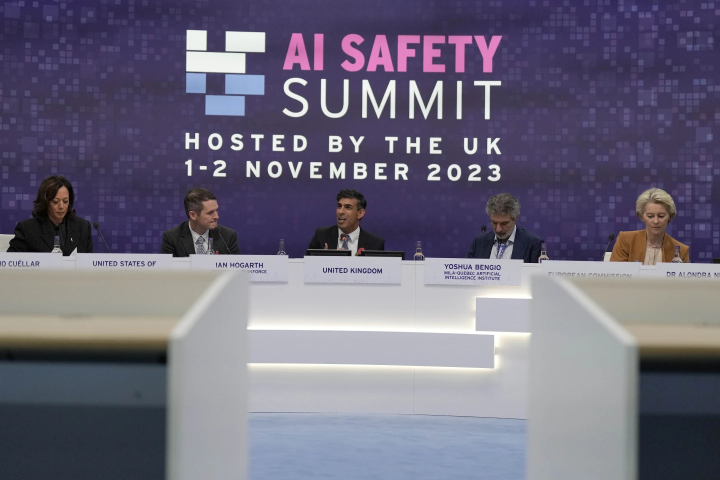
In the image, AI Safety Summit last year. (AP Photo/ Alastair Grant)
A recent comprehensive international assessment examining the safety implications of artificial intelligence (AI) reveals a deep-seated discord among experts regarding the potential risks associated with this technology. Spearheaded by Yoshua Bengio, a prominent figure in AI research from Canada, the report underlines the uncertain trajectory that lies ahead for general-purpose AI.
Emphasizing the unpredictable nature of AI's impact, the report underscores a spectrum of potential outcomes, ranging from highly beneficial to profoundly adverse, even in the near future. Initiated during last year's AI Safety Summit in the United Kingdom, this landmark report marks the inaugural global endeavor dedicated to scrutinizing the safety dimensions of AI.
Yoshua Bengio, renowned as a pioneering figure in AI and serving as the scientific director at Mila, the Quebec AI Institute, was entrusted with chairing the report by the U.K. government. Released ahead of an upcoming international summit on AI in Seoul, South Korea, the report delves into the rapid evolution of advanced AI systems and the considerable uncertainty surrounding their societal implications.
Acknowledging the swift pace of AI development, Bengio stresses the substantial ambiguity surrounding the potential ramifications of advanced AI on various aspects of human life and work in the foreseeable future. In a press release, the U.K. government heralded the report as a groundbreaking independent international scientific evaluation of AI safety, poised to significantly influence deliberations at the forthcoming summit in South Korea.
A cohort of 75 experts, including representatives nominated by 30 nations, the European Union, and the United Nations, contributed to the report. While the document released is an interim version, a final rendition is slated for release by year-end.
Focusing primarily on general-purpose AI systems, such as OpenAI's ChatGPT, capable of generating diverse content based on prompts, the report highlights persisting disparities among experts regarding AI capabilities, associated risks, and potential mitigation strategies.
Central to the ongoing debate are concerns surrounding the likelihood of substantial labor market disruptions, AI-enabled cyber threats, and the potential relinquishment of societal control over AI. Enumerating various risks, including the proliferation of fake content, dissemination of disinformation, and susceptibility to cyberattacks, the report also underscores the inherent biases within AI, particularly in critical domains like healthcare, employment, and financial services.
Among the envisioned scenarios, one alarming prospect entails humans losing oversight of AI systems, thereby exacerbating harm without recourse. While current AI technology doesn't inherently pose this risk, the report underscores the potential ramifications of ongoing efforts to develop autonomous AI, capable of independent decision-making.
The report underscores the absence of consensus regarding the plausibility, timing, and feasibility of mitigating loss-of-control scenarios, reflecting the intricate and evolving discourse surrounding AI safety.















